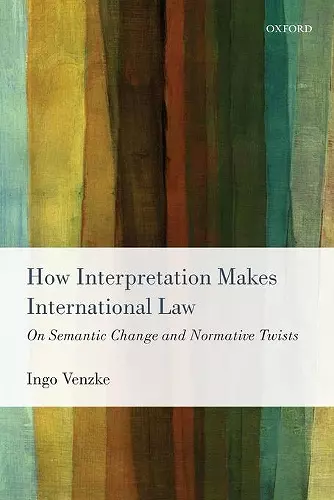How Interpretation Makes International Law
On Semantic Change and Normative Twists
Format:Paperback
Publisher:Oxford University Press
Published:3rd Apr '14
Currently unavailable, and unfortunately no date known when it will be back
This paperback is available in another edition too:
- Hardback£105.00was £105.00(9780199657674)

Winner of the 2014 ESIL Book Prize
An account of how the practice of interpretation makes international law, drawing specific attention to the increasing authority of international courts and institutions, this book analyses the role that the language plays in shaping international law. It addresses the key issue of how it contributes to the evolution of international norms.Challenging the classic narrative that sovereign states make the law that constrains them, this book argues that treaties and other sources of international law form only the starting point of legal authority. Interpretation can shift the meaning of texts and, in its own way, make law. In the practice of interpretation actors debate the meaning of the written and customary laws, and so contribute to the making of new law. In such cases it is the actor's semantic authority that is key - the capacity for their interpretation to be accepted and become established as new reference points for legal discourse. The book identifies the practice of interpretation as a significant space for international lawmaking, using the key examples of the UN High Commissioner for Refugees and the Appellate Body of the WTO to show how international institutions are able to shape and develop their constituent instruments by adding layers of interpretation, and moving the terms of discourse. The book applies developments in linguistics to the practice of international legal interpretation, building on semantic pragmatism to overcome traditional explanations of lawmaking and to offer a fresh account of how the practice of interpretation makes international law. It discusses the normative implications that arise from viewing interpretation in this light, and the implications that the importance of semantic changes has for understanding the development of international law. The book tests the potential of international law and its doctrine to respond to semantic change, and ultimately ponders how semantic authority can be justified democratically in a normative pluriverse.
Ingo Venzke's insightful work on the changing of international norms by way of interpretation comes at an opportune moment ... Its main achievement lies in its critical approach to exposing where authority and power really lie. * Irin Buga, British Yearbook of International Law *
Venzke's book is a highly rewarding read because it provides a subtle account of how contemporary practices of interpretation make international law ... There is a lot in this book to interest the theoretically-inclined reader, but it deliberately remains accessible to a wide international law audience. * Joshua Paine, Australian Year Book of International Law *
ISBN: 9780198712978
Dimensions: 235mm x 160mm x 19mm
Weight: 490g
344 pages